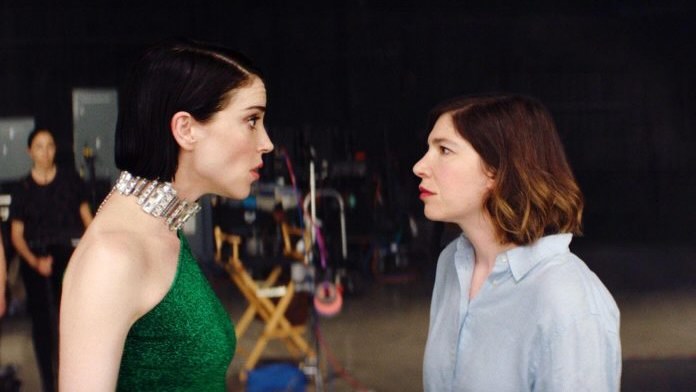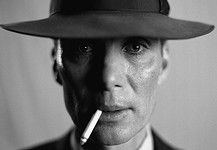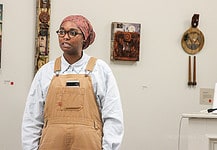Last Updated on September 21, 2021, 8:12 PM | Published: September 21, 2021
When David Bowie starred in Nicolas Roeg’s legendary 1976 sci-fi/drama “The Man Who Fell to Earth,” about a disguised alien obsessed with the glitz and glam of modern society and celebrity, it felt like a knowing nod to the camera.
By playing directly into the public’s perception of Bowie as the “Starman,” or the rock n’ roll alien, he was seemingly giving his audience exactly what they wanted, while also taking a firm grip on control of his own image and public character, a grip he would hold and manipulate to his own liking until his death.
But in the age of constant filming, never-ending social media, and expectations for access and candidness, how can an artist ever again hope to stay in control of their image while still maintaining that level of mystique and intrigue that Bowie so perfected? How can you give your audience just enough of what they want when audiences have come to want, and to expect, everything?
This is exactly the dilemma that Oklahoma-born singer, songwriter, multi-instrumentalist, actress, and screenwriter Annie Clark – better known as “St. Vincent” – is exploring with her new film, “The Nowhere Inn,” her new album “Daddy’s Home,” and her current world tour, which will see a home-state stop at The Criterion on October 5th.
An admitted lifelong superfan of Bowie, Clark is also perhaps the most likely and deserving heir to his secretive, chameleonic throne. Each new St. Vincent album presents a new sound, a new look, and in many ways, an entirely new personality.
St. Vincent is always changing. Annie Clark is always hiding.
“The Nowhere Inn”
That conceit forms the basis of her new film, “The Nowhere Inn,” in which she plays herself (or at least a version of herself) as her friend Carrie Brownstein (of “Portlandia” and the band Sleater-Kinney) attempts to film a documentary about Clark’s life on the road touring for her previous album, the day-glo, hyper-sexual “Masseduction.”
Brownstein quickly discovers that Clark is relentlessly boring and private, driving her to suggest to Clark that she try to play up her onstage “St. Vincent” persona a bit more off stage. Unsurprisingly, things go off the rails pretty quickly, all lines between reality and fantasy become blurred, and the film descends into a strange pastiche of David Lynch-ian surrealist horror.

It’s obvious from the outset that nothing in “The Nowhere Inn” is actually real, or that it is actually a documentary in any way. In reality, the film is directed by Bill Benz from a script written by Clark and Brownstein together.
But there is an odd level of authenticity in the spirit of the movie.
Clark narrates throughout, opining on the difficulty of a musician to define their work with words, and on the near impossibility of reconciling the rock star with the real person underneath. The movie is goofy, wacky, off-the-wall, whatever term you want to use, and it’s no doubt heavy-handed and oversells itself pretty hard, but then isn’t that also the point?
It’s a rumination about the performer’s instinct to put their walls up high enough to keep their personality safe, so why shouldn’t the film constantly insist upon itself and its own ham-fisted attempt at keeping the audience away from anything genuine or intimate or vulnerable?
“Daddy’s home”
All of this then brings us to St. Vincent’s most recent album, “Daddy’s Home.”
Ostensibly, the inspiration for the album was the release from prison of Clark’s father, Richard, who was convicted in 2010 of massive, far-reaching securities fraud, money laundering, and conspiracy. It became a major part of the St. Vincent mythos. Here was something huge and real and undoubtedly affecting for Clark, and everyone knew about it, but she still didn’t really talk about it. It was relegated to that private part of her life on which she still had a controlling grip.
So rather than let that part of her real, private life slip through, she decided to control it.
Her father’s imprisonment is used as a plot device late in “The Nowhere Inn,” a psychological Hail Mary that Brownstein uses to try to force Clark to finally give a genuine emotional reaction.
Brownstein’s character in the movie is exploiting this difficult, private issue, but Clark, as the film’s writer, is herself exploiting it for the sake of entertainment. When faced with choosing something real from her personal life for the characters to use as a rug-pulling, emotional twist, Clark chose the one thing about her real life that everyone already knows.
Even when the character of herself is faced with her greatest trauma, the real Annie Clark is still not revealing anything new about herself to her audience.
So it would make sense, in a way, for “Daddy’s Home” to finally be the moment where she throws back the curtain just enough to openly discuss her father’s crimes, his imprisonment, her own shame, and ultimately her feelings of reconciliation after his release.
But it’s not.
There are glimpses throughout of complicated emotion and familial turmoil, but mostly the main issue at play seems to be not the complexities of her parentage, but the difficulty of navigating something private having escaped her grasp in the first place. Many of the songs place her closed-off character within the uncomfortable confines of personal dramas, unable to allow her mask to slip enough to deal with it in a healthy way.
With these songs, we’re not seeing the struggle of Annie Clark to confront her father, we’re seeing the struggle of St. Vincent to confront Annie Clark.

Both the music and aesthetic on display are extensions of this element. Everything is presented within the guise of 70’s funk-rock. She wears a blonde bob and a monochromatic pantsuit or an evening gown and faux fur. Everything is about excess, the clothes, the dense, wall-of-sound production, the soaring guitar solos. It’s all in service of recalling one of the most excessive periods of rock history, and all intended to remind you of selfish wealth.
And yet, beneath all the glam and 70’s sheen, the songs are, at heart, about a woman that is fighting to control her own story. As ever, Clark’s songwriting throughout “Daddy’s Home” is rooted in the lifelong struggle of a woman to direct the course of her own life, to dictate to her own sexuality, to not just be a victim to her father’s choices. It was never about forgiving her dad or confronting his crimes. “Daddy’s Home” is about losing control of the narrative, exactly like the caricature of herself that she plays in “The Nowhere Inn.”
As St. Vincent, Clark has developed a career out of exploring the limitations of that Bowie-style mystique in the current world. We don’t expect our rock stars to be aliens anymore, we expect them to be flawed, damaged, wounded people with their scars on display for our amusement.
Just as her hero gave the world just enough “alien” to protect his mystique, Clark gives us just enough “Annie” to protect St. Vincent.
“The Nowhere Inn” is currently playing at Rodeo Cinema on Film Row. Showtimes and tickets at rodeocinema.org.
St. Vincent will be presenting her “Daddy’s Home” tour live at The Criterion on October 5th. Tickets and info are available now at criterionokc.com.
Brett Fieldcamp has been covering arts, entertainment, news, housing, and culture in Oklahoma for nearly 15 years, writing for several local and state publications. He’s also a musician and songwriter and holds a certification as Specialist of Spirits from The Society of Wine Educators.











